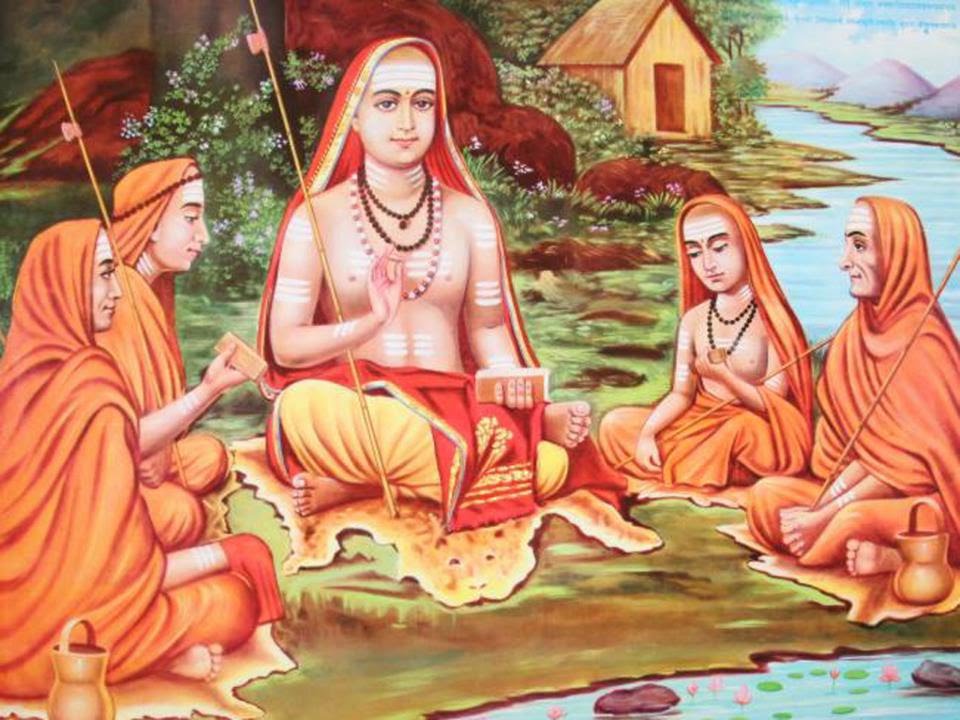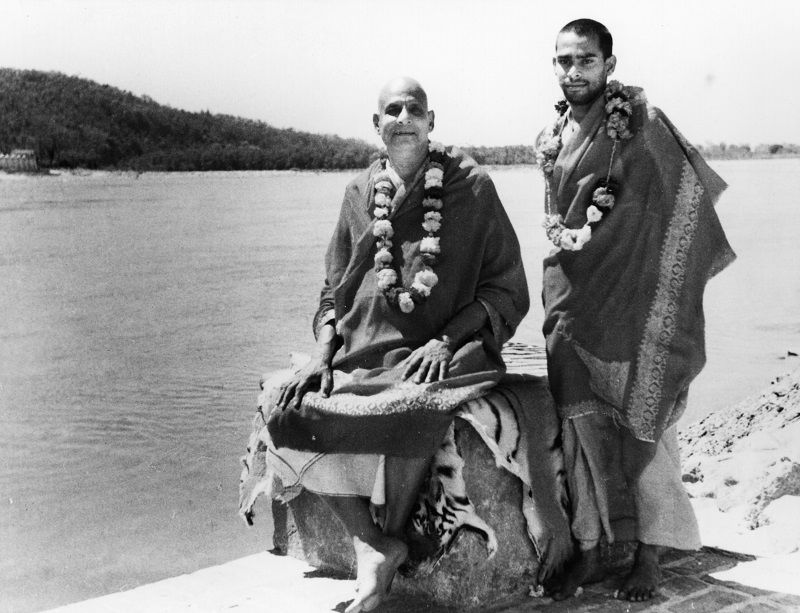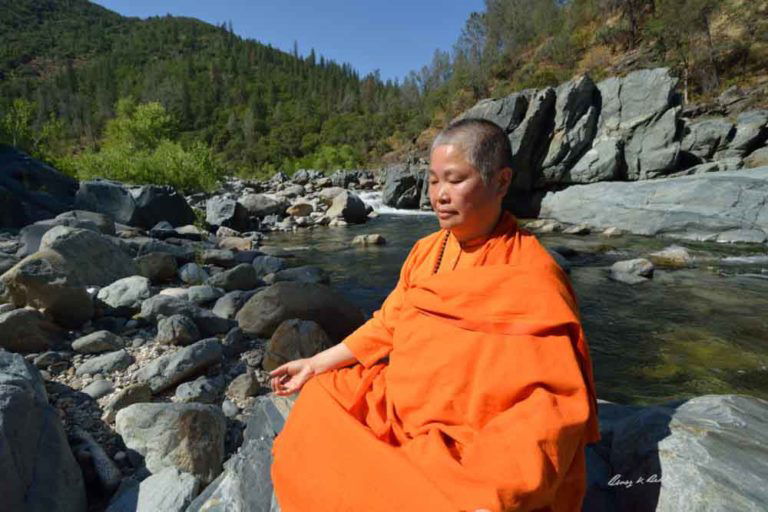Six Virtues of a Spiritual Seeker

1. SAMA – tranquility
Sama means tranquility, tranquility of the mind. It is the first virtue that you should get. As a yoga teacher, you encounter students who are very, very restless, changing up and down. What then, does the yoga teacher or Yoga Health Educator tell these people to do? If a person comes to you and he/she is very much up and down, what do you tell them to do? Meditation and self-enquiry? These are very high goals. They need to do something before that. The answer is they need to do asana and pranayama. That’s all it is.
Why? When they do asana, they slow down. Everything slows down. They coordinate the body, the breath, and everything slows down. With pranayama, it is the same. They slow down. They purify the nadis and the prana becomes more balanced. Already that allows them to have some insight, to have some vision, some kind of knowledge about the workings of their own mind. This brings them a little bit of peace, a little bit of serenity. Moreover, the classical bhakti yoga teaching gives them techniques for controlling the emotions. The mind is stirred up and made unsteady by the emotions. That’s why controlling the emotions, sublimating the emotions, is necessary to calm the mind down.
When they do asana, they slow down. Everything slows down.
Our actions are based on our thinking, but our thinking is being motivated by the emotions. Our reasoning is employed to simply justify the emotions. Swami Sivananda said the emotions are predominant in this era. The practice of pranayama helps to calm the emotions and number two, you need to chant to express the Divine Love. Practicing love in bhakti yoga means to practice unconditional love and not to practice attachment. When you practice unconditional love, you calm down, the mind calms down.
That’s all it is. When the mind calms down, you are able to see your Self. Bhakti yoga practice helps you to do that. Because we are here separated from our source, separated from ourselves, separated from our true nature, we feel lonely, we feel abandoned and in the dark, separated from Divine Mother and separated from Divine Father; we feel separated from everything, and we have to live with people that we don’t understand. Therefore, it is very difficult to love them. So then, practice tranquility, peace of mind. Some people look like they are calm, but inside they are like a tornado. However, when you practice tranquility, the mind is truly quiet. The churning of the mind needs to settle for you to rest in peace.

Patanjali Maharishi says very clearly in the Raja Yoga sutras, it’s impossible for a mind to understand a mind; it is impossible for the mind to understand itself. No matter how many thoughts you churn in the mind, it is not going to solve the problem that you have in mind. It is literally impossible for you to use your mind to comprehend somebody else’s mind. In Vietnamese there is an expression, “One talks duck, one talks chicken”. Ducks and chickens talking to each other. It’s not possible to understand each other.
That’s why we have so much interpersonal conflict because the mind is already so difficult for you to understand. Then you use that mind to understand somebody else’s mind and it’s impossible. That’s why you need to turn inward to understand your own mind. By calming your own mind and by bringing light to your own mind, you will be able to see another person’s mind. This seeing is not because you are able to see another person’s mind from your mind. It is the light of the Atman shining in your mind that allows you to see the Atman in the other person’s mind.You have to first work on your own peace.
Without that, there is no way you can see the Self, no way you can be happy, truly happy. Swamiji said, “Instead of peace of mind, we have pieces of mind”. This means, you project the conditions for you to be happy, you get the conditions fulfilled and you have a little glimpse of peace. You work very hard to get those conditions fulfilled to have another little piece of peace. And then again, you carry on, work out another contract, fulfill that, and earn another little piece of peace. In this way, we have pieces of mind, but we don’t have peace of mind. Because peace of mind has to come with wisdom, with a certain level of freedom, a certain level of unconditional comfort within yourself and in all situations.
That’s why we have so much interpersonal conflict because the mind is already so difficult for you to understand.
If you watch your life all the time, seeing if it fits your pre-set conditions, always being on the defensive, you will not have peace of mind. That is the unfortunate situation for most of us. It’s very difficult to let down our guard and very difficult for us to be open because we have been hurt for a long time. And you know, we wrongly attribute our hurt to someone else. We have been doing this for a very long time, wrongly attributing our hurt to someone else, therefore, carrying that memory and hoping to be free from hurt. But it’s not possible. In the same manner, in the Vedantic analogy of the “rope and snake,” you constantly see the ‘snake’ because the snake is in your mind, you are constantly projecting the idea of the hurtful snake outside, superimposing the snake on a piece of ‘rope’ and say, “Oh, that snake is going to bite me!” Yes, you run away, but you see the snake again. Because it’s in your mind. That’s why you constantly repeat your patterns of unhappiness. So, even though “sama” is the first virtue, it takes a long, long time to get the peace.

2. DAMA: Control of the Senses
Dama means to control the senses. The Vedantic teacher Adi Shankaracharya spelled it out clearly. He says that if you are very disturbed by the senses then you do not have peace of mind. It is something that you can work on. If you have any kind of addiction, any kind of uncontrolled sensual desire, then you are not qualified. That is why you have to go and work very hard on the control of the senses. Why is control of the senses so important? If we have discrimination, we cannot carry on with this idea that life is about sensual enjoyment. We cannot carry on with this idea that whatever we see outside is real.
We cannot carry on with the idea that this life of the five senses is the only life, because yoga and Vedanta say “no”, there is an inner life. There is an inner life that we need to explore.Yes, this life is a projection of your mind and it’s there to distract you. This life of the senses is there to distract you. So, if you can control the senses, you will have fewer distractions, you will be able to turn inward and you will be able to realize your Self.

3. UPARATI: Satiety
Uparati is the goal of turning inward. That means you are able to lead an inner life and you are able to see your Self. You would have to sort yourself out from within, as all answers are from within. If you constantly hanker for something external, you will not be able to turn within. Uparati is resolutely turning away from the external, so you can sort yourself out from within. It is the control of the senses; it goes with withdrawing of the senses.
In yoga, we call it Pratyahara which is the phase before meditation. Basically, you won’t have any success in meditation if you are not able to turn inward.When you do asanas and pranayama, what happens? You are starting to turn inward. That’s how it works. Because asanas regulate your prana and make you less subject to prana imbalances or subject to the pull of the emotions and the senses. When you start to practice you start to have a glimpse of the Self because you are turning inward. You turn inward when you practice savasana. Now you have a glimpse of this kind of inner peace.
4. TITIKSHA: Endurance
Titiksha is endurance or forbearance. This is very important because you can turn inward and practice meditation or yoga, but you may not see the happiness that is being promised.On the contrary, you might have back pain, neck pain, or you feel very bored. You don’t know what you’re doing when you start to meditate. That’s why endurance and forbearance is required. You need to stick to the practice at all costs. That’s what the yogi tries to practice in the beginning. Of course, if you have back pain you will have to move a little bit, you don’t torture your body. There must be some moderation, but if you run away from your practice out of any kind of discomfort then you will not have the necessary qualification for you to sort through your mind and to realize your Self. That is why you need to endure the difficulties brought by your own body, your own mind, and emotions.Scripture says there are different kinds of suffering.
Suffering can come from external elements (fires, floods), from the mind and its interaction with other people, and from your own existence in the body which is constantly changing. Pain and discomfort can be moving all the time. Ayurveda says that vata aggravation creates pain. Western medicine cannot understand this because they treat symptoms. Western medicine cannot understand why pain shows up in different places. Someone with this kind of pain most likely has a tendency to worry, and the more he or she worries, the more they create anxiety that leads to more moving pain. They will not have the necessary peace to turn inward.
There must be some moderation, but if you run away from your practice out of any kind of discomfort then you will not have the necessary qualification for you to sort through your mind and to realize your Self.
You would need to build up your strength and endurance and to “bear insult, bear injury”. Pain can be mental. Someone saying the wrong thing about you is pain; hearing people talk nonsense is pain; eating food that you cannot digest in the body and the mind is painful. Everything can be painful.Why does the seeker need to learn to endure? The seeker after Truth wants to be free from suffering altogether. The seeker knows the mind’s tendency to go up and down and its condition to react to external things. So, the seeker would endure. To endure means to remember the Self amidst the ups and downs of the mind. The pain is there, but the pains are not new. Therefore, you endure when you have pain, and you remember, “I am the Self”.
People in the pandemic, when their whole cities and country are in lockdown, are having much pain and difficulty these days. Yet, when I talk to them about Self-remembrance, they thank me for my talk and are not rejecting it as unrealistic. To some level, there is wisdom within them even though they suffer from pain. But to hear someone say, “The pains are not real. You are real. Your immortal Self is real. You are blissful in reality.” They are thankful. Therefore, we have to constantly repeat to ourselves the truth, even though our minds scream the untruth. Forbearance means to remember the truth so that you can bear the karma.
5. SHRADDHA: Faith
We need to cultivate faith. When we lose faith, we feed ourselves with doubts. Some people do not have any faith at all. Most people suffer a lot because they have no faith. For people in difficult situations that have faith, somehow they have a better quality of life, while people who don’t have any faith think that logic can explain everything. When their logic cannot explain things, they think everything is collapsing. In some way, it’s very good that everything is collapsing. This helps you to realize that the intellect is incapable of seeing the big picture.How do we nurture faith? When we don’t have the answer and you say, “God knows,” you can also say, “I surrender to the wisdom of the universe, there must be a reason why things are like that.” Or you can say, “I have faith that it will work itself out.
”3 Types of Faith1. Faith in one’s own Self
Self-reliance, or faith in one’s Self, means we rely on our own inner strength, dwelling within us, as opposed to relying on an ego self. Fear exists when we don’t know the Truth about the Self (the Atman). Until we have such knowledge of the Self from our own direct experience, we must rely on faith in order to progress in our life. Ultimately faith is replaced by direct experience of the Self. Truth or Knowledge can be glimpsed intuitively, even if we do not have a name for it. SO CALM DOWN AND TRUST YOURSELF. One student approached me very worried because she had a cough and had just travelled back from England and wondered if she should go to the hospital and be tested. I told her, “Look within, ask yourself the question, “Am I going to die soon? Am I healthy?” To which she nodded. She regained confidence and overcame her fears by being asked to find the answer from within.
Until we have such knowledge of the Self from our own direct experience, we must rely on faith in order to progress in our life.
The Truth that sets us free from all fears, resides inside of us. It is a long, hard journey to find it. We must start on that journey with humility and sincerity. We lack experience in the beginning, as we do not really have a clue where to look when trying to look within. Faith keeps us going on that journey.
2. Faith in Nature and the Supreme Intelligence
Meditate, shift consciousness from the past to the present. Try to see a bigger picture and channel your emotions into devotion; have the courage to face your illusions. Faith in the Supreme springs from an inner feeling that there is something greater than you, a Supreme being that indwells one’s essential spirit. When one is enriched with abiding faith, one recognizes Grace operating in all things. We are on a journey of Self-discovery to uncover the truth of who we are, a journey guided by faith. We can think of faith as the bridge that carries us from one experience of Grace to the next.
3. Faith in the teachings and the practices
The sacred teachings say that you are like the Shining Sun untouched by fear and diseases. There are days when clouds fill the sky and we cannot see the sun. You know the sun is there. To regain that vision of the inner sun, we must learn to clear away the impurities of the mind by observing the Niyamas (purity, contentment, austerity, Self-study, Self-surrender). Self-surrender means accepting what is; letting go and letting the Divine will prevail. Let it be. Bear the consequences of past actions arising in the present. Have faith that eventually everything will pass. We must also practice endurance and know that the journey is not going to happen overnight. The challenge of enduring past karma is learning not to react or retaliate. Forgive and forget.